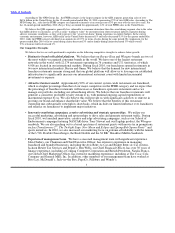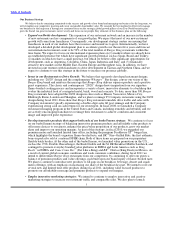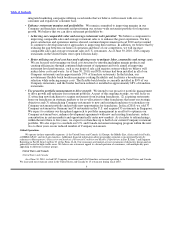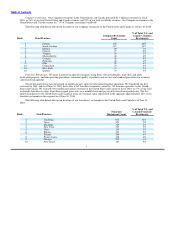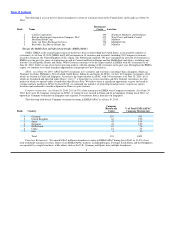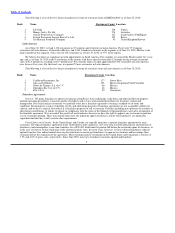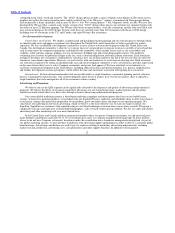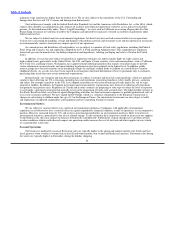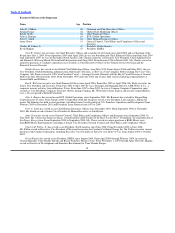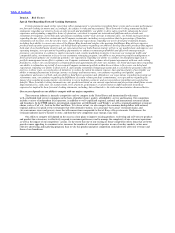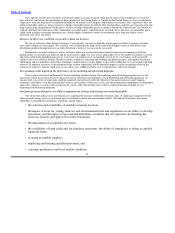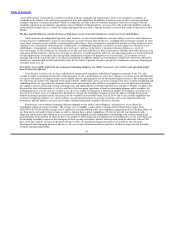Burger King 2010 Annual Report Download - page 16
Download and view the complete annual report
Please find page 16 of the 2010 Burger King annual report below. You can navigate through the pages in the report by either clicking on the pages listed below, or by using the keyword search tool below to find specific information within the annual report.
Table of Contents
and removing the equipment owned by Coca−Cola and installed in Company restaurants in the three years prior to the termination.
Management Information Systems
Company and franchise restaurants typically use a point of sale, or POS, cash register system to record all sales transactions at the
restaurant. We have not historically required franchisees to use a particular brand or model of hardware or software components for
their restaurant system and franchisees have traditionally reported summary sales data manually, which limited our ability to verify
sales data electronically. We have the right under our franchise agreement to audit franchisees to verify sales information provided to
us.
In January 2006, we established POS specifications to reduce costs, improve service and allow better data analysis and approved
three global POS vendors and one regional vendor for each of our three segments to sell these systems to our restaurants. As of June 30,
2010, we had installed these new POS systems in all Company restaurants and in 57% of franchise restaurants. Once fully implemented,
this POS system will make it possible for restaurants to submit their sales and transaction level details to us in near−real−time in a
common format, allowing us to maintain one common database of sales information and to make better marketing and pricing
decisions. Franchisees are required to replace legacy POS systems with the approved POS system over the next few years, depending on
the age of the legacy system. All franchisees must have the new POS systems in their restaurants by no later than January 1, 2014.
Quality Assurance
We are focused on achieving a high level of guest satisfaction through the periodic monitoring of restaurants for compliance with
our key operations platforms: Clean & Safe, Hot & Fresh and Friendly & Fast. We measure our Hot & Fresh and Friendly & Fast
operations platforms principally through Guest Tracsm, a rating system based on survey data submitted by our customers. We review the
overall performance of our operations platforms through an Operations Excellence Review, or OER, which focuses on evaluating and
improving restaurant operations and guest satisfaction.
We and an independent outside vendor administer the Restaurant Food Safety certification, which is intended to bring heightened
awareness to food safety, and includes immediate follow−up procedures to take any action needed to protect the safety of our
customers.
We have uniform operating standards and specifications relating to selection of menu items, maintenance and cleanliness of the
premises and employee conduct. In addition, all Burger King restaurants are required to be operated in accordance with quality
assurance and health standards which we establish, as well as standards set by federal, state and local governmental laws and
regulations. These standards include food preparation rules regarding, among other things, minimum cooking times and temperatures,
sanitation and cleanliness.
We closely supervise the operation of all of our Company restaurants to help ensure that standards and policies are followed and
that product quality, guest service and cleanliness of the restaurants are maintained. Detailed reports from management information
systems are tabulated and distributed to management on a regular basis to help maintain compliance. In addition, we conduct scheduled
and unscheduled inspections of Company and franchise restaurants throughout the Burger King system.
Intellectual Property
We own valuable intellectual property including trademarks, service marks, patents, copyrights, trade secrets and other proprietary
information. As of June 30, 2010, we owned approximately 3,440 trademark and service mark registrations and applications and
approximately 889 domain name registrations around the world, some of which are of material importance to our business. Depending
on the jurisdiction, trademarks and service marks generally are valid as long as they are used and/or registered. We also have
established the standards and specifications for most of the goods and services used in the development, improvement and operation of
Burger King restaurants. These proprietary standards, specifications and restaurant operating procedures are trade secrets owned by us.
14


